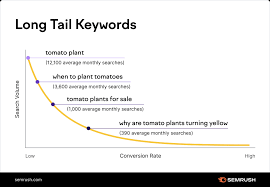Search engine optimization (SEO) is an important strategy for any website looking to increase its visibility and traffic. One of the most important elements of SEO is performing keyword research to identify relevant search terms. Long-tail keywords are becoming increasingly important as web browsers have become more specific in their queries. Identifying effective long-tail keywords can help you tap into a more targeted audience and improve your overall SEO performance.
Long-Tail Keywords Overview
Long-tail keywords are a powerful tool for SEO professionals and marketers. They are longer, more specific phrases that help identify niche audiences and target them with relevant content. This article will provide an overview of long-tail keywords, their benefits, and tips on how to use them effectively in keyword research.
Long-tail keywords can be used to attract highly targeted web traffic since they offer a much more specific search intent than short, generic terms. By focusing on long-tail keywords that are closely related to the services or products your business offers, you can optimize your website for users who have already expressed interest in what you have to offer. This means that when people search for these long-tail keywords, they’re likely closer to making a purchase decision than if they had just searched for generic terms. Here are ISB SEO Pros to help you rank new long-tail keywords for your business:
Benefits of Using Long-Tail
In today’s competitive digital landscape, businesses must find innovative ways to optimize their websites and increase visibility on search engine results pages (SERPs). One of the best ways to do this is by utilizing keyword research for long-tail keywords. Long-tail keywords are phrases that are more specific than traditional two or three-word phrases. When used correctly, they can provide a variety of benefits for businesses looking to reach new audiences and generate higher rankings in SERPs.
Long-tail keywords tend to have less competition than shorter, more generic phrases. This means that businesses using them can achieve higher rankings in SERPs with less effort and cost than competitors who use the same short-term keywords. Additionally, long-tail keyword phrases usually convert better because they include words related directly to what customers are searching for.
Finding Long-Tail Keywords
Keyword research is essential for a successful online presence. With the right keywords, site owners can ensure that their content reaches its target audience and stands out in search engine rankings. Long-tail keywords are particularly useful when it comes to keyword research as they drive more highly targeted and qualified traffic to websites.
Long-tail keywords are phrases consisting of three or more words that focus on niche topics within a particular industry or subject area. They have lower volume searches than shorter, more general terms but they typically convert higher because they target an audience with specific interests. When used correctly, long-tail keywords can be extremely effective in driving quality website traffic and improving SEO performance.
The key to finding the right long-tail keywords is in understanding your target audience’s needs and interests.
Prioritizing Long Tail Keywords
Prioritizing Long Tail Keywords is an important step in developing a successful keyword research strategy. Long-tail keywords are phrases that focus on the more specific aspects of a product or service, making them great for targeting niche audiences. By focusing on these keywords, businesses can gain a competitive edge and better target potential customers who are actively searching online for what they need.
In order to maximize the effectiveness of long-tail keywords, it’s important to prioritize them in your keyword research process. This means researching which terms and phrases will be most relevant to your product or service and focusing on those keywords first. With careful analysis and selection, businesses can use long-tail terms to their advantage by gaining more visibility within search engines and driving higher levels of targeted traffic back to their website.
Conclusion
The importance of keyword research for long-tail keywords cannot be overstated. Long-tail keywords are essential to creating effective and targeted content, which can help optimize website visibility and drive targeted web traffic. The use of long-tail keywords provides a range of benefits that should not be overlooked when it comes to online success.
First, long-tail keywords are more specific than generic ones and thus provide more focused search results for users. This improved accuracy in searches leads to better user experience as they find what they’re looking for with greater efficiency. Additionally, since these terms are often less competitive and have lower search volumes, it is easier to rank higher for them than for popular phrases with high competition levels – meaning there’s a better chance of appearing at the top of the SERPs (Search Engine Results Pages).

